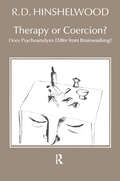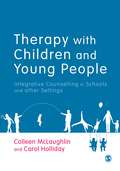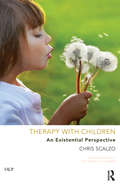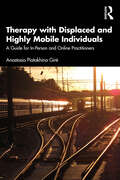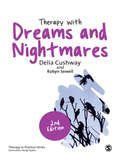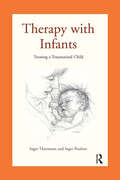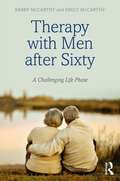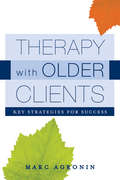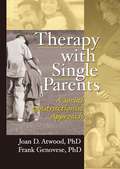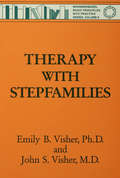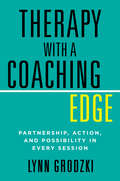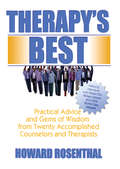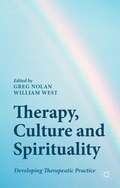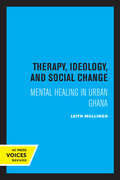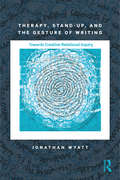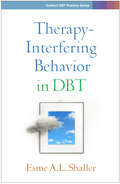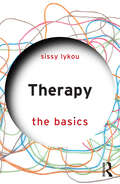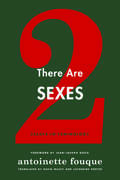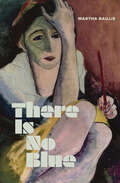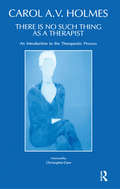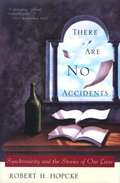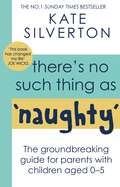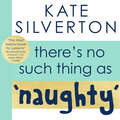- Table View
- List View
Therapy or Coercion: Does Psychoanalysis Differ from Brainwashing?
by R.D. HinshelwoodThis book focuses on the professional ethics of medicine and psychiatry, to know whether psychoanalysis differs from brainwashing. It addresses a divergence—a choice between repression and splitting, and examines how the findings concerning a divided mind relate to philosophical issues.
Therapy with Children and Young People: Integrative Counselling in Schools and other Settings
by Carol Holliday Colleen MclaughlinTherapy with Children and Young People addresses the practice of child therapy in school settings in a unique level of detail. The authors adopt a broad ecosystematic, integrative approach that considers the influence of family, school and the wider community, placing emphasis on significant development and attachment issues. As well as providing a solid ground in developmental theory, the authors explore the contextual and professional issues of working in a school setting. A wide range of activities and exercises (including using the creative arts to engage with young people through play, story, metaphor and imagery) help you to apply theory to practice in a new way. Challenging ethical dilemmas, such as sharing sensitive information and communicating with parents and teachers, are explored with the support of lively case studies. Covering therapy with children from infant to secondary school, this book will be your essential resource if you wish to work therapeutically in schools.
Therapy with Children: An Existential Perspective (The\united Kingdom Council For Psychotherapy Ser.)
by Chris ScalzoThis book explores the existential themes and challenges present in all therapeutic relationships when working with children. Existential ideas and concepts are a rapidly growing influence on the practice of psychotherapy and yet their application to work with children remains largely unexplored. This book begins to redress this imbalance in a practical and engaging way by presenting an existential perspective on some key themes in practicing psychotherapy with children, including: play, anxiety, guilt, choice, family relationships, language and process. Each chapter is punctuated with engaging vignettes of case material, blending theoretical insight with the realities of practice. Through these narratives readers are challenged to question their own assumptions and beliefs whether they are new to existential psychotherapy or already immersed in its rich philosophical traditions. Children are born into the world without choice and are drawn towards making connections with others, developing self-awareness and personal identity.
Therapy with Children: Children's Rights, Confidentiality and the Law (Ethics in Practice Series)
by Mr Peter Jenkins Debbie DanielsTherapy with Children is a vital resource for any practitioner navigating the legal minefield of working with children and young people. Prioritising the needs of the child as the client, the authors explore the legal and professional dimensions of working therapeutically with children. This long-awaited second edition responds to significant shifts in policy and the revised text additionally addresses: - the importance of confidentiality in establishing a working alliance and maintaining a secure environment for therapy with children - the conflicting pressures faced by therapists concerning issues of parental involvement and children at risk - changes in light of the Children Act 2004, Mental Health Act 2007, and the Axon case - changes in the organisation of child protection - increased provision of therapeutic services for children, particularly in school settings, and the growing numbers of counsellors working with children - the relevance of psychoanalysis in development of child-focused therapy, as well as reference to other therapeutic approaches to child therapy - the urgent case for developing 'confidential spaces' within therapeutic services for children and young people. Illustrated with vivid case examples, Therapy with Children provides stimulating reading and is an excellent source of reference for all psychotherapists and counsellors working with children. The issues here will also be of direct relevance to youth workers, teachers, social workers and health professionals.
Therapy with Displaced and Highly Mobile Individuals: A Guide for In-Person and Online Practitioners
by Anastasia Piatakhina GiréThis book provides therapists with an understanding of displacement-related issues to help them better serve potential clients such as emigrants, expats, migrants, digital nomads – all those who have left their original home country behind and moved to a different culture and place. With the spread of communication technologies, psychotherapists are expanding their practice to the online setting and into the unfamiliar waters of transcultural counselling with highly mobile and displaced individuals. Building on her research, the author brings up new concepts in therapy practice with emigrants, calling for a displacement-focused, transcultural approach for a modern psychotherapy practice, blended or online, in a world shaped by ubiquitous displacement. Giré’s own experience of relocations and multicultural families have helped her develop a personal approach to universal topics of the therapeutic endeavour, such as displacement, multilingualism, and shame. Meeting displaced individuals’ mental health needs is a priority for the mental health community. Therapy with Displaced and Highly Mobile Individuals will be of interest to all therapists working online with this client group, and for all those interested in psychotherapy (therapists or not), who want to learn about the psychological issues created by displacement.
Therapy with Dreams and Nightmares: Theory, Research & Practice (Therapy in Practice)
by Robyn Sewell Delia Joyce Cushway'Delia Cushway's wealth of experience makes this new edition an essential read for all aspiring counsellors, psychologists and psychotherapists as well as for more experienced practitioners seeking to enhance their practice' - Prof Sue Wheeler, Director of Doctoral Programme, Institute of Lifelong Learning 'I found the book fascinating, illuminating not only my client's material but also my own night-life. The book's strength lies in integrating perspectives from many different psychotherapeutic disciplines, from psychoanalytic to cognitive' - Diana Sanders, Counselling Psychologist and Cognitive Psychotherapist This practical book shows how dreamwork can be a fruitful therapeutic tool for all therapists and practitioners in the helping professions. Emphasising that dreams are a powerful means of accessing an individual's emotions, creativity and wisdom, Delia Cushway has updated the first edition to include: - Skills for working with trauma and survivors of sexual abuse - Cross-cultural, spiritual and religious approaches to dreamwork - Up-to-date research and theory on using Cognitive, Objectivist and Constructivist models and methods - The importance of reflective practice - Scientific functions and meanings of dreams and their role in information processing and memory consolidation. Steeped in practical hints and tips, vivid case examples and methods of interpreting dream language, this highly accessible guide is an invaluable resource for therapists. Delia Cushway is Emeritus Professor of Clinical Psychology at Coventry University and a practising Registered Clinical Psychologist. Robyn Sewell is a Chartered Psychologist and Group Psychotherapist, now fully retired.
Therapy with Infants: Treating a Traumatised Child
by Inger Poulsen Inger ThormannWhen a child without a fully developed language experiences physical and psychological stress that exceeds the child's capacity to cope, the experience can leave lasting marks, unless the child receives treatment. Infant therapy is a method inspired by the work of the French pediatrician and psychoanalyst Francoise Dolto and her student Caroline Eliacheff. The method can be applied both with infants and with older children. The most important messages are, "Never allow the child's pain to be forgotten," and "Everything that is left unsaid ties up energy." In therapy, the therapist puts the child's stressful experiences into words. The infant's story is told, the words bring order to the child's chaos, and the trauma becomes an identified part of his or her life. Infant therapy is primarily a therapeutic intervention aimed at traumatised infants, but the method can also be applied in daily educational practices by preschool teachers, nurses, teachers, day care providers and parents.
Therapy with Men after Sixty: A Challenging Life Phase
by Barry McCarthy Emily McCarthyTherapy with Men after Sixty is a breakthrough book for professionals that helps them open their clients’ minds to new ways of thinking, behaving, and feeling about the aging process. The authors adopt a realistic but optimistic tone as they carefully examine the psychological, relational, and sexual aspects of life after 60, while also dispelling common myths. Topics addressed include how to build and maintain Psychological Well Being, have quality relationships, build self-esteem, and deal with crisis and loss. Practical topics, such as financial issues, living situations, and relationships with adult children and grandchildren are addressed through guidelines, skill exercises, and case studies. Each chapter helps mental health professionals to account for individual, couple, cultural, and value differences, making this an unparalleled resource for helping men successfully meet the challenges of aging.
Therapy with Older Clients: Key Strategies for Success
by Marc AgroninBasic strategies and tips for doing effective therapy with elderly clients. What is it like to be 106 years old? What are the mental health needs of someone this old, and for that matter, all elderly? Can we, as clinicians and caregivers, ever really understand old age and provide for their needs adequately? How can we prevent the physical problems they face from overwhelming the patience and care that we give? What are the most effective therapeutic tools that underlie all successful therapy work with older clients? Caring for the elderly is complex, challenging work. Often they are wrestling with a unique set of medical, psychiatric, and social challenges, all set against the backdrop of their approaching mortality. The therapist’s job is to successfully navigate these challenges without dwelling on the inevitability of physical decline, and to provide the most compassionate, valuable treatment possible. It is with this guiding principle in mind that Marc Agronin, a dedicated geriatric clinician with years of on-the-ground experience, offers a sensitively-written and eminently practical guide that addresses the therapeutic challenges, and uncovers the top strategies for compassionate and effective work with the elderly. Therapy with older clients, Agronin argues, requires a sensitivity to the tension between the body’s physical decline and its simultaneous capacity for mental growth and maturation. Therapists must learn to handle these seemingly opposing forces with varying client types and in different settings, and reconcile their own fears of aging, disability, and death. At times this therapeutic relationship can be difficult: medications are often not as effective as they are in younger clients, and the elderly often view change at such a late stage of life as pointless. However, Agronin encourages therapists to work with creativity and passion, persisting in their efforts by retooling their approaches, shoring up patience, and remembering that the very presence of a caring listener can bring a spectacular transformation to even the most debilitated individuals. An understanding of aging alone does not make an effective therapist, and Agronin offers key strategies—illustrated through real-life case examples—for dealing with countertransference, performing age-guided evaluation, working with caregivers, and handling end-of-life issues. He explains the impact of aging on the major psychiatric disorders, providing direction on how to cultivate empathy and understanding for a range of age-specific challenges. Agronin offers a compassionate, insightful narrative that explores the nuances of successful rapport-building and problem-solving that can enrich the lives of the elderly. In doing so, he gives readers a better understanding of what it means to grow old, and how cultivating a respectful, productive relationship—one that is inspired with curiosity and energized with creativity—can bring joy and affirmation to older clients.
Therapy with Single Parents: A Social Constructionist Approach
by Joan D Atwood Frank GenoveseProvide effective counseling to members of single-parent familiesWith more than half of all first marriages ending in divorce, it&’s time to re-think the notion that "divorce" means "failure." Therapy with Single Parents focuses on the strengths of the single-parent family rather than its weaknesses, stressing the need to look at the socially constructed norms, values, and definitions associated with marriage and family in order to provide effective counseling. This unique book examines experiences that are common to single parents and presents interventive strategies for treating single-parent family issues, drawing on clinical case studies to provide technical knowledge in everyday language.Current research shows that single parents account for 27 percent of family households that include children under 18 and that the number of single mothers in the United States more than tripled between 1970 and 2000. Therapy with Single Parents challenges outdated notions that the single-parent family is somehow deficient and associated with adjustment problems in children. It doesn&’t ignore the anger, pain, sadness, and guilt experienced by many members of single parent families but offers therapeutic considerations from a more balanced approach. The book examines the social, psychological, and sexual experiences of newly single parents and addresses the ups and downs they&’ll face in dealing with schools, the workplace, and social services. Therapy with Single Parents examines: social and psychological differences between divorce and widowhood cognitive-behavioral principles of single-parent families what children can learn from divorce dealing with the ghosts of past relationships relationship rules dealing with adult children and extended families the effect of change in divorcing families the feminization of poverty the therapeutic value of social networksTherapy with Single Parents is an invaluable resource for psychologists, professional counselors, social workers, and marriage and family therapists. The book presents a thorough, in-depth examination of the single-parent family system as a viable, healthy family form.
Therapy with Stepfamilies
by Emily B. Visher John S. VisherFirst published in 1996. Routledge is an imprint of Taylor & Francis, an informa company.
Therapy with a Coaching Edge: Partnership, Action, And Possibility In Every Session
by Lynn GrodzkiBringing “coaching skills” to a therapy practice and clients. In Therapy with a Coaching Edge, professional practice guru Lynn Grodzki offers a new, paradigm-changing therapy model—adding the leverage and action of a coaching approach to the wisdom and goals of psychotherapy. This book presents a set of powerful coaching strategies that have been adapted and designed specifically for therapy—to provide more reach and range for therapists and counselors while not requiring a wholesale abandonment of therapeutic principles. Using this model, therapists at all levels of experience can promote behavioral change without insisting on homework or rigid protocols. Clients can spot results in each and every therapy session. Resistance to treatment often softens and client retention improves. Grodzki gives new and veteran clinicians the skills to not only improve client outcomes, but also energize themselves as practitioners. Therapists feel empowered as they learn to ask compelling questions that generate "ah-ha" moments. They help clients go beyond a discussion of symptoms to explore topics of core values. They show clients how to make decisions based on both necessity and a vision of a better future. The model provides readers with just-in-time learning, to identify a skill when it is needed an then immediately apply the steps in a session. Grodzki, an expert psychotherapist and master certified coach, has proven herself to be a trusted voice for therapists through her writing and workshops; she makes the steps to using a coaching approach understandable by offering lively case examples, "your turn" exercises, and sample scripts to give her readers the confidence and context to move forward.
Therapy's Best: Practical Advice and Gems of Wisdom from Twenty Accomplished Counselors and Therapists
by Howard RosenthalInsightful interviews with a Who&’s Who of the world&’s foremost therapistsTherapy&’s Best is a lively and entertaining collection of one-on-one interviews with some of the top therapists and counselors in the world. Educator and psychotherapist Dr. Howard G. Rosenthal talks with twenty of therapy&’s legends, including Albert Ellis, arguably the greatest clinical psychologist and therapist of our time; assertiveness training pioneer Robert Alberti; experiential psychotherapist Al Mahrer; and William Glasser, the father of reality therapy and choice theory. Each interview reveals insights into the therapists&’ personal lives, their observations on counseling, and the helping profession in general, and their thoughts on what really works when dealing with clients in need. The interviews found in Therapy&’s Best uncover treatment strategies that are often missing from traditional textbooks, journal articles, courses, and seminars related to assertiveness training, Rational Emotive Behavior Therapy (REBT), marriage and family counseling, transactional analysis, psychoanalysis, suicide prevention, voice therapy, experiential psychotherapy, and Emotion Focused Therapy (EFT). Conversations with the "best and brightest" (including two recipients of the American Psychological Association&’s Division of Psychotherapy&’s "Living Legends" award) reveal why these therapists are such effective helpers, what makes their theories so popular, and most important, what makes them tick. This unique book lets you "rub elbows" with these consummate professionals and learn more about their theories, ideas, and experiences. Therapy&’s Best includes interviews with: Dr. Albert Ellis-creator of Rational Emotive Behavior Therapy (REBT) and APA Division of Psychotherapy "Living Legend" Dr. Edwin Schneidman-the foremost expert on suicide prevention, suicidology, and thanatology Richard Nelson Bolles-author of What Color Is Your Parachute? Dr. Dorothy and Dr. Ray Bevcar-husband and wife therapists who write textbooks on marriage counseling Dr. Al Mahrer-father of experiential psychotherapy and APA Division of Psychotherapy "Living Legend" Les Greenberg-father of Emotion-Focused Therapy (EFT) Muriel James-co-author of Born to Win and many more!Therapy&’s Best is a must read for professionals who practice counseling and psychotherapy, students preparing to do likewise, and anyone else with an interest in therapy-and the people with provide it.
Therapy, Culture and Spirituality
by Greg Nolan William WestThis edited collection addresses how therapy can engage with issues of race, culture, religion and spirituality. It is a response to the need for practitioners to further their understanding and skills base in developing ways of appropriately responding to the interconnectivity of these evolving issues.
Therapy, Ideology, and Social Change: Mental Healing in Urban Ghana (Comparative Studies of Health Systems and Medical Care)
by Leith MullingsThis title is part of UC Press's Voices Revived program, which commemorates University of California Press’s mission to seek out and cultivate the brightest minds and give them voice, reach, and impact. Drawing on a backlist dating to 1893, Voices Revived makes high-quality, peer-reviewed scholarship accessible once again using print-on-demand technology. This title was originally published in 1984.
Therapy, Stand-Up, and the Gesture of Writing: Towards Creative-Relational Inquiry (Writing Lives: Ethnographic Narratives)
by Jonathan WyattTherapy, Stand-Up, and the Gesture of Writing is a sharp, lively exploration of the connections between therapy, stand-up comedy, and writing as a method of inquiry; and of how these connections can be theorized through the author’s new concept: creative-relational inquiry. Engaging, often poignant, stories combine with rich scholarship to offer the reader provocative, original insights. Wyatt writes about his work as a therapist with his client, Karl, as they meet and talk together. He tells stories of his experiences attending comedy shows in Edinburgh and of his own occasional performances. He brings alive the everyday profound through vignettes and poems of work, travel, visiting his mother, mourning his late father, and more. The book’s drive, however, is in bringing together therapy, stand-up, and writing as a method of inquiry to mobilise theory, drawing in particular from Deleuze and Guattari, the new materialisms, and affect theory. Through this diffractive work, the text formulates and develops creative-relational inquiry. With its combination of fluent story-telling and smart, theoretical propositions, Therapy, Stand-up, and the Gesture of Writing offers compelling possibilities both for qualitative scholars who have an interest in narrative, performative, and embodied scholarship, and those who desire to bring current, complex, theories to bear upon their research practices.
Therapy-Interfering Behavior in DBT (Guilford DBT Practice Series)
by Esme A. ShallerTherapy-interfering behavior (TIB) is a key treatment target in dialectical behavior therapy (DBT), second only to suicidal thinking and self-harm. This wise, engaging book gives clinicians everything they need to assess, understand, and address TIB both in clients and in themselves. Therapists learn how to orient clients to TIB and work with it effectively whenever it shows up, using a combination of validation, contingency management, and dialectics. Packed with clinical examples, dialogues, and practical tips, the book discusses the full range of DBT contexts, from individual therapy to skills class, phone coaching, and consultation teams.
Therapy: The Basics (The Basics)
by sissy lykouTherapy: The Basics is an introductory book to psychotherapy and its different theoretical approaches. It attempts to demystify and de-stigmatise therapy by answering some common questions posed by prospective clients.lykou presents an accessible overview of psychotherapy and counselling, mapping a variety of the most popular approaches from psychoanalysis and cognitive behavious therapy to embodied and creative therapies, whilst giving an overview of the roots of psychotherapy in traditional and indigenous healing methods. The book also acknowledges criticisms of current approaches, with their neo-liberal heteronormative Eurocentric perspective, and considers where therapy stands in today’s globalised world. The book's structure allows different umbrella theories and their developments to be explored separately but also in relation to one another.This book is essential reading for trainees, a useful reference for qualified therapists who want to deepen their knowledge, a supporting resource for prospective psychotherapy clients, and a companion for readers who simply want to expand their horizons.
There Are Two Sexes: Essays in Feminology
by Antoinette FouqueAntoinette Fouque cofounded the Mouvement de Libération des Femmes (MLF) in France in 1968 and spearheaded its celebrated Psychanalyse et Politique, a research group that informed the cultural and intellectual heart of French feminism. Rather than reject Freud's discoveries on the pretext of their phallocentrism, Fouque sought to enrich his thought by more clearly defining the difference between the sexes and affirming the existence of a female libido. By recognizing women's contribution to humanity, Fouque hoped "uterus envy," which she saw as the mainspring of misogyny, could finally give way to gratitude and by associating procreation with women's liberation she advanced the goal of a parity-based society in which men and women could write a new human contract. The essays, lectures, and dialogues in this volume finally allow English-speaking readers to access the breadth of Fouque's creativity and activism. Touching on issues in history and biography, politics and psychoanalysis, Fouque recounts her experiences running the first women's publishing house in Europe; supporting women under threat, such as Aung San Suu Kyi, Taslima Nasrin, and Nawal El Saadaoui; and serving as deputy in the European Parliament. Her theoretical explorations discuss the ongoing development of feminology, a field she initiated, and, while she celebrates the progress women have made over the past four decades, she also warns against the trends of counterliberation: the feminization of poverty, the persistence of sexual violence, and the rise of religious fundamentalism.
There Is No Blue
by Martha BaillieTHE GLOBE AND MAIL: BOOKS TO READ IN FALL 2023Martha Baillie’s richly layered response to her mother’s passing, her father's life, and her sister’s suicide is an exploration of how the body, the rooms we inhabit, and our languages offer the psyche a home, if only for a time. Three essays, three deaths. The first is the death of the author’s mother, a protracted disappearance, leaving space for thoughtfulness and ritual: the washing of her body, the making of a death mask. The second considers the author’s father, his remoteness, his charm, a lacuna at the centre of the family even before his death, earlier than her mother’s. And then, the shocking death of the author’s sister, a visual artist and writer living with a diagnosis of schizophrenia, who writes three reasons to die on her bedroom wall and then takes her life."Martha Baillie’s novels are thrillingly, joyously singular, that rare combination of sui generis and just plain generous. That There Is No Blue, her memoir, is all of those things too, is no surprise; still, she has gone somewhere extraordinary. This triptych of essays, which exquisitely unfolds the “disobedient tale” of the lives and deaths of her mother, her father, and her sister, is a meditation on the mystery and wonder of grief and art making and home and memory itself. It made me think of kintsugi, the Japanese art of repair, in which the mending is not hidden but featured and beautifully illuminated. Baillie’s variety of attention, carved out of language, is tenderness, is love." – Maud Casey, author of City of Incurable Women"This is a stunning memoir, intense and meticulous in its observations of family life. Baillie subtly interrogates and conveys the devastating mistranslations that take place in childhood, the antagonism and porousness of siblings, and the tragedy of schizophrenia as it unfolds. I couldn’t put it down." – Dr. Lisa Appignanesi, author of Mad, Bad and Sad and Everyday Madness"Exquisite." – Souvankham Thammavongsa, author of How to Pronounce Knife"I am grateful for this profound meditation on family and loss.” – Charlie Kaufman, filmmaker"This strange, unsettling memoir of outer life and inner life and their bizarre twining captures the author’s identity by way of her mother’s death, her sister’s failing battle with mental illness, and the mysterious figure of her father. It combines anguished guilt, deep tenderness, and bemused affection in highly evocative, often disturbing prose. Its brave honesty is amplified by a persistent lyricism; its undercurrent of fear is uplifted by a surprising, resilient hopefulness. It is both a plea for exoneration and an act of exoneration, an authentic meditation on the terrible difficulty of being human." – Andrew Solomon, author of The Noonday Demon
There Is No Such Thing As A Therapist: An Introduction to the Therapeutic Process
by Carol HolmesThis book deals with the link between the purpose of therapy and the boundaries of the therapeutic situation, which - the author argues - derive from the omnipresence of the anxiety surrounding separations and death. The theoretical framework of this book is part of a developmental line from Freud, Klein and Winnicott to Langs, via Sartre and Buber.
There are no Accidents
by Robert H. HopckeAn informal examination of Jung's theory of synchronoicity through the telling of stories.
There's No Such Thing As 'Naughty': The groundbreaking guide for parents with children aged 0-5: THE #1 SUNDAY TIMES BESTSELLER
by Kate SilvertonTHE #1 SUNDAY TIMES BESTSELLER'This book has changed my life' Joe Wicks'As a parenting support book this is in a class of its own . . . It is perhaps the most helpful book for parents of children of any age' Professor Peter Fonagy, CEO Anna Freud National Centre for Children & Families'This is a book that will change lives' Dr Suzanne Zeedyk, Infant Psychologist'This book is absolutely brilliant! I love that it is about parenting a healthy brain' Dr Guddi Singh, Paediatrician and Health CampaignerWant to know the secret to tackling tantrums and tears, stopping squabbles in seconds AND lay the foundations for your child's good mental health in the process? In There's No Such Thing As 'Naughty', mum to two young children, journalist and children's mental health advocate Kate Silverton shares her groundbreaking new approach to parenting under-fives that helps to make family life so much easier and and certainly a lot more fun!Kate's unique strategies, easy-to-follow scripts and simple techniques will enable you to manage those tricky everyday challenges with ease - and help you to enjoy the strongest bond possible with your child, both now and in the years ahead. Endorsed by leading figures in the field of children's mental health, at the heart of the book is a simple and revelatory way to understand how your child's brain develops and how it influences their behaviour. Rooted in the latest science - explained really simply - this engaging, accessible and warm parenting guide will redefine how you see and raise your children, with a new understanding that for under-fives, there can be no such thing as 'naughty'.
There's No Such Thing As 'Naughty': The groundbreaking guide for parents with children aged 0-5: THE #1 SUNDAY TIMES BESTSELLER
by Kate SilvertonTHE #1 SUNDAY TIMES BESTSELLER'This book has changed my life' Joe Wicks'As a parenting support book this is in a class of its own . . . It is perhaps the most helpful book for parents of children of any age' Professor Peter Fonagy, CEO Anna Freud National Centre for Children & Families'This is a book that will change lives' Dr Suzanne Zeedyk, Infant Psychologist'This book is absolutely brilliant! I love that it is about parenting a healthy brain' Dr Guddi Singh, Paediatrician and Health CampaignerWant to know the secret to tackling tantrums and tears, stopping squabbles in seconds AND lay the foundations for your child's good mental health in the process? In There's No Such Thing As 'Naughty', mum to two young children, journalist and children's mental health advocate Kate Silverton shares her groundbreaking new approach to parenting under-fives that helps to make family life so much easier and and certainly a lot more fun!Kate's unique strategies, easy-to-follow scripts and simple techniques will enable you to manage those tricky everyday challenges with ease - and help you to enjoy the strongest bond possible with your child, both now and in the years ahead. Endorsed by leading figures in the field of children's mental health, at the heart of the book is a simple and revelatory way to understand how your child's brain develops and how it influences their behaviour. Rooted in the latest science - explained really simply - this engaging, accessible and warm parenting guide will redefine how you see and raise your children, with a new understanding that for under-fives, there can be no such thing as 'naughty'.
There's No Such Thing As 'Naughty': The groundbreaking guide for parents with children aged 0-5: THE #1 SUNDAY TIMES BESTSELLER
by Kate SilvertonTHE #1 SUNDAY TIMES BESTSELLER'This book has changed my life' Joe Wicks'As a parenting support book this is in a class of its own . . . It is perhaps the most helpful book for parents of children of any age' Professor Peter Fonagy, CEO Anna Freud National Centre for Children & Families'This is a book that will change lives' Dr Suzanne Zeedyk, Infant Psychologist'This book is absolutely brilliant! I love that it is about parenting a healthy brain' Dr Guddi Singh, Paediatrician and Health CampaignerWant to know the secret to tackling tantrums and tears, stopping squabbles in seconds AND lay the foundations for your child's good mental health in the process? In There's No Such Thing As 'Naughty', mum to two young children, journalist and children's mental health advocate Kate Silverton shares her groundbreaking new approach to parenting under-fives that helps to make family life so much easier and and certainly a lot more fun!Kate's unique strategies, easy-to-follow scripts and simple techniques will enable you to manage those tricky everyday challenges with ease - and help you to enjoy the strongest bond possible with your child, both now and in the years ahead. Endorsed by leading figures in the field of children's mental health, at the heart of the book is a simple and revelatory way to understand how your child's brain develops and how it influences their behaviour. Rooted in the latest science - explained really simply - this engaging, accessible and warm parenting guide will redefine how you see and raise your children, with a new understanding that for under-fives, there can be no such thing as 'naughty'.
